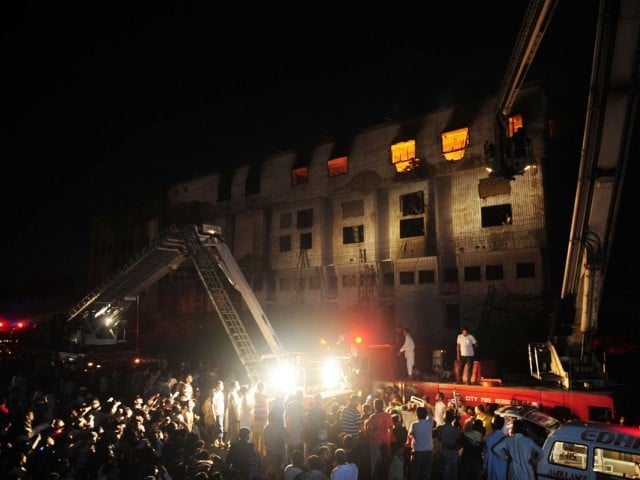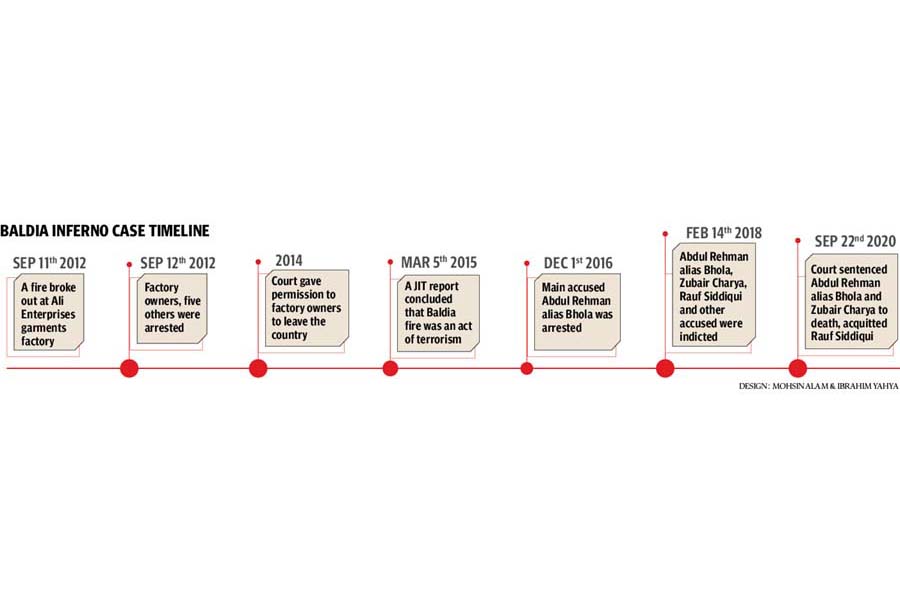
An anti-terrorism court (ATC) announced the verdict of the Baldia Factory Fire on Tuesday sentencing two to death and convicting four others for the deadliest industrial blaze in Pakistan’s history. Over 259 workers were burnt alive in the inferno, and yet, the route to yesterday’s judgement spanned over eight gruelling years, punctuated with countless delays, interference from political and influential corners, and several investigations. The Express Tribune takes a look back.
The fire engulfed the Ali Enterprises garment factory in Baldia Town on September 11, 2012, killing 259 workers. Subsequent DNA and forensic analysis recorded the fatalities at 264, as recounted in the ATC’s judgement.
The next day, factory owners Abdul Aziz Bhaila, Shahid Bhaila and Arshad Bhaila were arrested along with the factory’s managing staff.
The case was initially dubbed an accident, and on February 1, 2013, the investigation officer removed the murder clause from the case.
Though, non-governmental organisations, labour rights’ groups and civil society exerted pressure, including petitions in court, for a thorough inquiry of the fire.
An interim challan was filed the following October in which the factory owners and the arrested management staff were charged. In 2014, the Bhaila brothers, who had earlier acquired bail, moved to Dubai with the court’s permission.
It wasn’t until 2015 that the Sindh High Court ordered that the investigation be reopened after allegations of extortion and arson against the Muttahida Qaumi Movement (MQM) came to light.
On February 6, 2015, Sindh Rangers submitted a report before the court with regards to Rizwan Qureshi, a man arrested from Clifton in an illegal arms case. According to the report, Qureshi revealed that the blaze was not the result of any technical fault but had instead been intentionally ignited. He told that the factory was set ablaze by workers of the MQM because the factory owners failed to pay Rs200 million as ‘protection’ money.
To investigate these claims, a joint-investigation team was set up in March 2015.
A year later, in March 2016, the JIT submitted a progress report which recognised the fire as an act of arson and terrorism. The following August, a challan was submitted before the court against former chief of the MQM’s Karachi Tanzeemi Committee, Hammad Siddiqui, two party workers Abdul Rehman alias Bhola and Zubair Charya, and others. The businessmen embezzled funds paid by the factory owners intended as compensation for the victims and their families.
On September 5, 2016, the presiding judge of the case transferred it to a special ATC.
Then, on December 1, 2016, Rehman Bhola was arrested in Bangkok by the Federal Investigation Agency (FIA) and the Interpol and produced before the court in Pakistan two weeks later.
Bhola recorded his confessional statement before the judicial magistrate later the same month. According to the confessional statement, Bhola was told about Ali Enterprises factory and tasked with asking for the extortion amount. Bhola went to the factory owners and told them Hammad Siddiqui had sent him to collect the money. When the Bhaila brothers said they could not pay more than Rs10 million, Bhola told them they must make him a shareholder of the business or the factory would be set ablaze. Bhola further stated that he contacted Mansoor, and later went to Nine Zero, along with Zubair Charya, and explained that the owners were only paying Rs10m. At this, told Bhola, Siddiqui was enraged and instructed him to set the factory on fire. Pressured by the uproar in the aftermath of the crime, Rauf Siddiqui filed a case against the factory owners, according to Bhola.
Following Bhola’s statement, MQM leader Rauf Siddiqui was included in the ambit of the investigation, and in April 2017 the police filed another challan.
Bhola, Charya and others were nominated in this challan while Hammad Siddiqui was declared wanted. But Rauf Siddiqui’s name was absent. The prosecutor objected to this and petitioned the court to direct that Rauf be nominated as well and produced before the court.
The prosecutor’s petition was approved and in January 2018, MQM’s Rauf Siddiqui was produced before the court. The accused were subsequently indicted in 2018.
The initial witness list submitted by the prosecution named 768 persons but 364 names were subsequently dropped, and 400 witness statements were recorded during the course of the trial. Several reports of witness intimidation and threats also emerged during the trial. Special public prosecutor Sajid Mehboob Sheikh was also reportedly threatened during the trial and attacked on three separate occasions.
After many trials and tribulations the case has finally been concluded with the ATC acquitting Rauf Siddiqui, who was also a provincial minister at the time, and Iqbal Adeel Khanum, Umar Hassan and Dr Abdul Sattar Khan, and sentencing Bhola and Charya to death.
Published in The Express Tribune, September 23rd, 2020.























1714024018-0/ModiLara-(1)1714024018-0-270x192.webp)









COMMENTS
Comments are moderated and generally will be posted if they are on-topic and not abusive.
For more information, please see our Comments FAQ